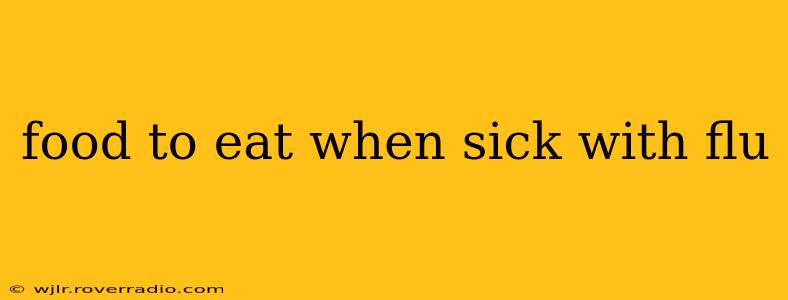Feeling under the weather with the flu? Knowing what to eat can significantly impact your recovery. While rest is crucial, the right foods can provide your body with the nutrients it needs to fight off the virus and regain strength. This guide explores the best foods to consume when battling the flu, addressing common questions along the way.
What Should I Eat When I Have the Flu?
When you're battling the flu, your body needs easily digestible, nutrient-rich foods to support your immune system. Focus on foods that are gentle on your stomach but packed with vitamins, minerals, and antioxidants. Think broths, soups, and soft fruits. Avoid anything too greasy, spicy, or heavy, as these can exacerbate nausea and upset your stomach.
What Foods Help You Recover Faster from the Flu?
Several foods can accelerate your recovery from the flu. These include:
-
Broths: Chicken broth, bone broth, or vegetable broth are excellent choices. They provide hydration, electrolytes, and are easy on a queasy stomach. The warmth can also be soothing.
-
Soups: Similar to broths, soups offer hydration and essential nutrients. Choose soups with plenty of vegetables for added vitamins and minerals. Avoid creamy soups, which can be harder to digest.
-
Bananas: These are a good source of potassium, an electrolyte often depleted during illness, helping to regulate fluid balance. Their soft texture makes them easy to eat when you lack appetite.
-
Rice: Plain rice is gentle on the digestive system and provides easily digestible carbohydrates for energy.
-
Toast: Similar to rice, plain toast offers simple carbohydrates for energy and is easy to digest.
-
Applesauce: Another easily digestible option, applesauce provides vitamins and fiber.
-
Ginger Ale: Ginger has anti-inflammatory properties that may help soothe nausea. Choose a version without excessive sugar.
-
Citrus Fruits (in moderation): Oranges, grapefruits, and lemons are rich in Vitamin C, a powerful antioxidant that supports the immune system. However, their acidity might irritate a sensitive stomach, so start with small amounts.
What Drinks Are Best When You Have the Flu?
Hydration is paramount when fighting the flu. Aim to drink plenty of fluids to replace those lost through sweating and vomiting. Good choices include:
-
Water: The best choice for hydration.
-
Electrolyte drinks: These replace essential minerals lost through dehydration. Choose options with lower sugar content. Homemade electrolyte drinks are often a healthier choice.
-
Herbal teas: Chamomile or ginger tea can be soothing and may help alleviate nausea.
What Should You Avoid Eating When You Have the Flu?
Certain foods can worsen symptoms or hinder recovery. It's best to avoid:
-
Fatty or greasy foods: These are difficult to digest and can exacerbate nausea.
-
Spicy foods: These can irritate your stomach lining.
-
Sugary foods and drinks: While they might provide a temporary energy boost, sugary foods can weaken your immune system and lead to energy crashes.
-
Dairy products: Some individuals find that dairy products worsen their symptoms.
-
Alcohol and caffeine: These can dehydrate you and interfere with sleep, hindering recovery.
Can I Eat Anything If I Have the Flu?
While the foods listed above are generally recommended, individual tolerance varies. Listen to your body and choose foods that you can comfortably eat without triggering nausea or digestive upset. Small, frequent meals might be better tolerated than large ones.
How Long Does it Take to Recover From the Flu?
Most people recover from the flu within a week to 10 days. However, recovery time can vary depending on the severity of the illness and individual factors. Rest and proper nutrition play a vital role in speeding up the recovery process.
What are the symptoms of the flu?
Flu symptoms typically include fever, cough, sore throat, body aches, headache, and fatigue. Some individuals may also experience nausea, vomiting, and diarrhea. If you experience severe or worsening symptoms, seek medical attention.
This information is intended for general knowledge and informational purposes only, and does not constitute medical advice. It is essential to consult a healthcare professional for any health concerns or before making any decisions related to your health or treatment.
